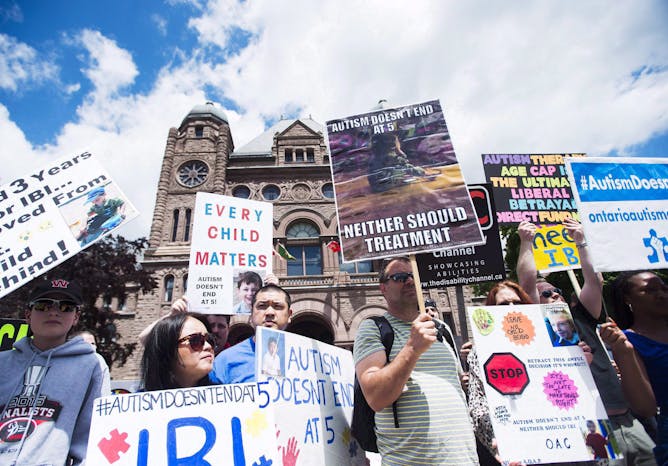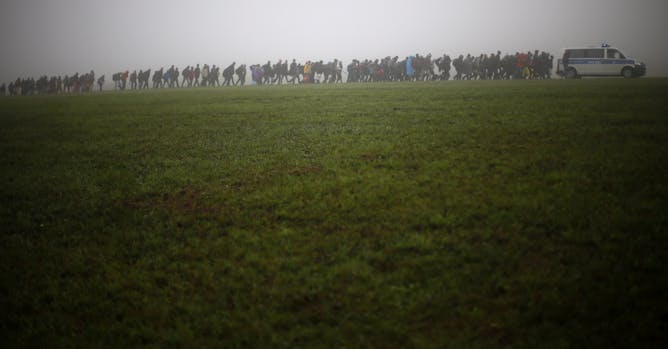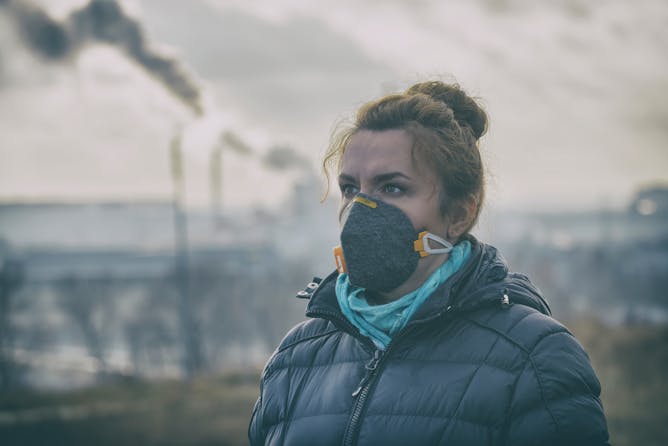|
Janet McLaughlin is an associate professor of health studies at Wilfrid Laurier University. She is also a mother of a young boy with autism. Today in The Conversation Canada, she writes passionately as both a researcher and a mother to explain why the Ontario government’s recent changes to its autism program will hurt children and their families.
Donald Trump was in El Paso, Tex., on Monday to make his case that the United States needs tougher immigration laws. While Trump’s immigration policies have gained a lot of headlines, Antje Ellermann of the University of British Columbia points out he’s not the first western leader to bring in discriminatory immigration policies – the practice has been around for more than a hundred years and still exists in many countries today.
Fans of the movie The Matrix will want to read the analysis by sociologist Mike Sosteric of Athabasca University, who says like the character Neo in the film who’s presented with the choice of a red pill or a blue pill, we must also make a choice about our future: continue to be a society addicted to accumulation or switch to a more sustainable way of living that may improve our quality of life.
And finally…Valentine’s Day is quickly approaching and Yue Qian of the University of British Columbia has an interesting article about love – or, really, the lack of love – in South Korea. It’s a story of why women are marrying later in life (if at all) and why government buildings sometimes go dark to encourage more dating.
Regards,
|

In 2016, parents protested the previous Ontario Liberal government’s decision to cut therapy for autistic children aged five and older. Moves by Ontario’s Conservative government have also raised concerns.
THE CANADIAN PRESS/Nathan Denette
Janet McLaughlin, Wilfrid Laurier University
An autism policy researcher and the mother of an affected child weighs in on the recent changes announced to the Ontario Autism Program.
|

In this October 2015 photo, German federal police officers guide a group of migrants on their way after crossing the border between Austria and Germany. Once granted citizenship, newcomers face near-impossible hurdles to reunite their families.
(AP Photo/Matthias Schrader)
Antje Ellermann, University of British Columbia; Agustín Goenaga, Lund University
It's important to unearth how discriminatory immigration policy, largely invisible to the general public, undermines citizens’ rights and position.
|

Unavoidable crises will upend the world we live in.
Shutterstock
Mike Sosteric, Athabasca University
Unavoidable crises will upend the world we live in but a shift from addictive accumulation to sustainable living may improve our quality of life.
|

The South Korean government has decided to dim its office lights at
7 p.m. and shorten its work week hoping to encourage young people to date again. A favourite lover’s activity is to put a lock on Namsan mountain’s Seoul Tower to declare love.
Shutterstock
Yue Qian, University of British Columbia
South Korea is facing a low fertility trend. Valentine's Day serves as a reminder to help ease the domestic burden on young women so they can consider partnerships again.
|

Les données démontrent que la croissance des polluants atmosphériques - ainsi que la hausse des températures, l'augmentation des pluies et les inondations - établissent un lien entre le cancer du sein et les changements climatiques.
Shutterstock
Jane E. McArthur, University of Windsor
La plupart des cas de cancer du sein sont liés à des causes environnementales. Lorsque nous parlons des changements climatiques, nous ne devons pas négliger cette partie de l'histoire.
|
Arts
|
-
Ruth Deller, Sheffield Hallam University
No big political statements this year but plenty of strong roles for women as two films emerge as firm favourites for Oscar Best Picture honours.
|
|
Environment + Energy
|
-
Bill Laurance, James Cook University
The natural world depends on insects to function, but they may be the next casualty of climate change.
|
|
Science + Technology
|
-
Emilee Rader, Michigan State University
Every device that you use, every company you do business with, every online account you create – they all collect data about you and analyze it to figure out minute details of your life.
|
|